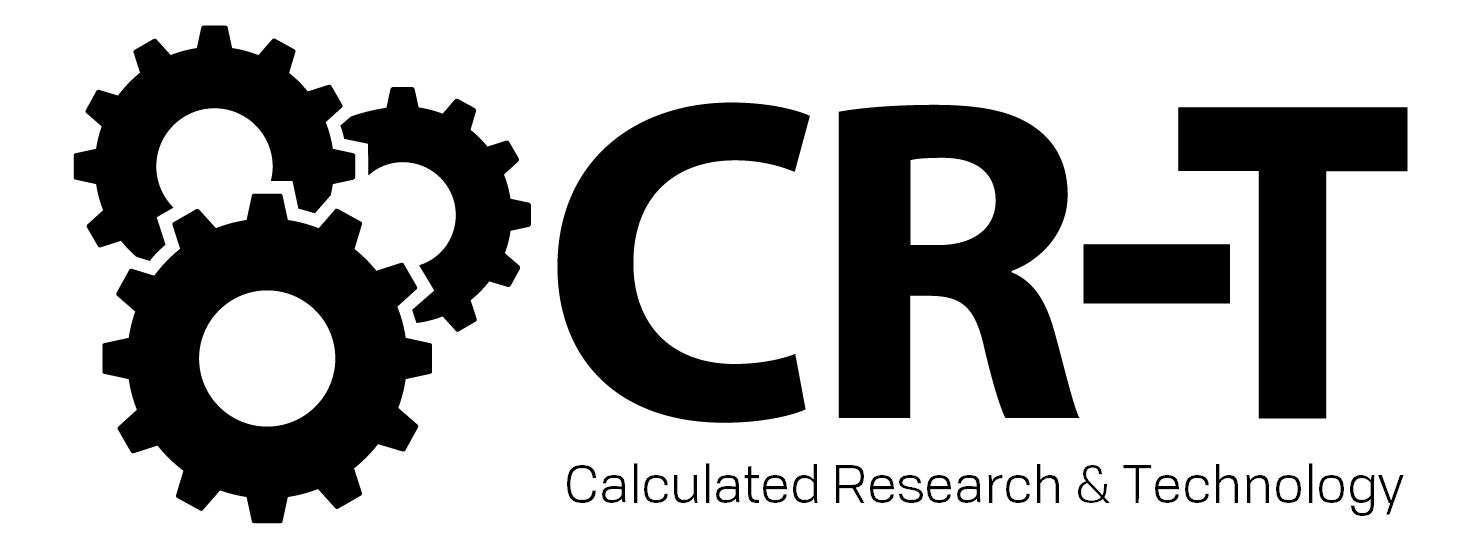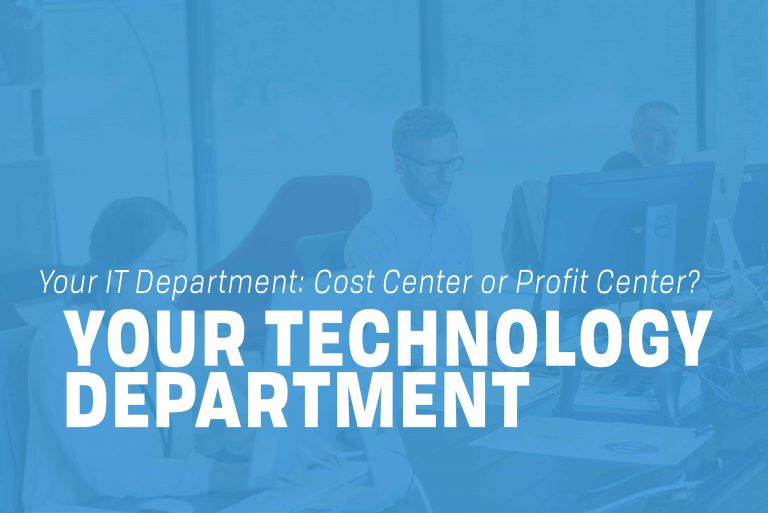A lot of businesses view their IT department as a cost center, a kind of necessary evil that doesn’t seem to render much profit. While it does cost money to fund equipment and pay your employees’ salaries, your IT department also makes you more profitable. In fact, with the right tools and mindset, your IT department can go from being a cost center to a profit center.
It’s natural for business owners to complain about how much money an IT team costs. That is, until something breaks and you need them to fix it.
Like a marketing team, it can be difficult to see exactly how an IT department is benefiting your company. Sure, the marketing team advertises for the business and creates leads. But since marketing doesn’t directly bring in revenue—like the sales team, for example—it’s harder for them to justify their worth.
However, if the marketing team were suddenly to lose all functionality, the entire business would take a hit. Advertisements would no longer target ideal clients, and potential clients would have a harder time finding the business.
In a similar way, it can be difficult to recognize your IT department’s true worth. But while they might not bring in direct sales, they are still a valuable part of your company. When managed effectively, your IT department can completely revolutionize the way you run your business.
What Does an IT Department Do?
A lot of us think about IT as the guys who swoop in every time your computer crashes and fix everything by pushing a few buttons. But what about when everything’s working? What does an IT department actually do every day?
Governance
Generally, an IT department’s main functions can be broken down into three main categories. The first is governance, the decision-making framework of IT. Members within an organization come together to ensure that IT is being used effectively and efficiently in order to support the business in achieving its goals.
Infrastructure
- Hardware: including servers, computers, switches, etc.
- Software: Enterprise Resource Planning (ERP), Customer Relationship Management (CRP), and other applications
- Network: enablement, internet connectivity, and security
- Meatware: human users who make up the IT department
Functionality
Finally, functionality refers to the day-to-day tasks that technicians perform. This includes creating and maintaining applications, securing data, and assisting in software and data management. Additionally, the IT department provides tech support to those within the company.
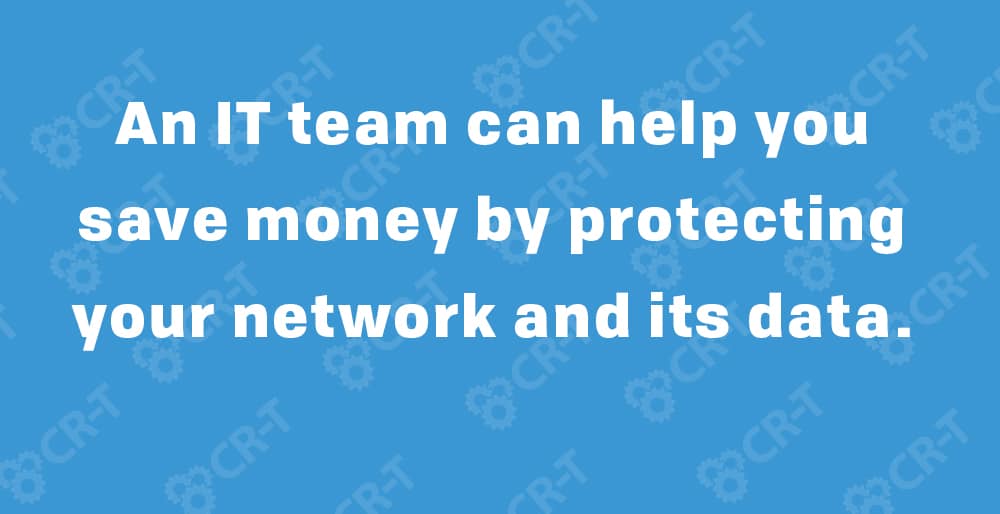
Your IT Department and Security
An IT team can help you save money by protecting your network and its data. Other components of security, such as network access control, save you time by filtering who has access to specific data.
Antivirus and Firewall
Antivirus software protects your computer from the constant bombardment of viruses on the Internet. Additionally, an antivirus can show the current health of your computer and run updates to detect malware or other malicious software. Generally, the IT team will help you set up antivirus and ensure that updates are happening regularly.
Similarly, a firewall also protects you from malicious threats. However, instead of scanning your computer for viruses, a firewall blocks dangerous traffic before it can enter the network in the first place. IT professionals can install one of a variety of firewalls and set it to blacklist specific forms of traffic.
By installing an antivirus and firewall, your IT department is not only protecting your computer from dangerous software. They are also helping you understand how different actions affect your computer so that you can be more proactive about security.
Access Control
In addition to installing devices that prevent harmful traffic from entering the network, your IT department also takes measures to ensure that your data is secure. Access control restricts who can view and alter specific information. This prevents an outsider from stealing or leaking valuable data. It also means that once an employee leaves the company, he/she will no longer be able to access secure information.
Access control might not seem to have direct financial consequences, but imagine what would happen if important, sensitive information became encrypted, stolen, or corrupted? Your company would likely face financial consequences, whether they be physical damages, legal fees, or loss of business due to a damaged reputation.
By implementing access control, your IT department is both protecting data and saving the company from a variety of financial risks.
Endpoint Security
Installing computers and switches is not the end of an IT professional’s relationship with hardware. After their installation, your system’s endpoints are susceptible to a variety of risks. 41% of businesses report that they frequently detect malware (Solutions Review). If you aren’t careful, you could let in malware through the endpoint itself.
Your IT department protects your endpoints through software and a variety of other security measures. In addition, they may create security policies to minimize user risk.
Educate Employees
Perhaps the most important thing an IT department can do is to educate employees on the importance of security and ensure they are following company policies.
Sometimes, employees put the network at risk through user error. In 2018 alone, 264,483 unique types of phishing scams were reported (Trustwave).
And phishing scams are becoming more of a problem every year. According to a Verizon Data Breach Investigations Report, half of recipients open emails and click phishing links within the first hour of being sent (Phishing Box).
By educating employees about phishing and other security threats, IT departments can help businesses avoid the negative consequences of a security breach.
Additionally, employees put the network at risk through weak security measures. Trustwave estimates that 28% of security breaches result from poor passwords and 28% from weak remote access security.
IT departments should create strong security policies that require employees to follow security best practices. That way, the company can fully defend itself against outside threats.
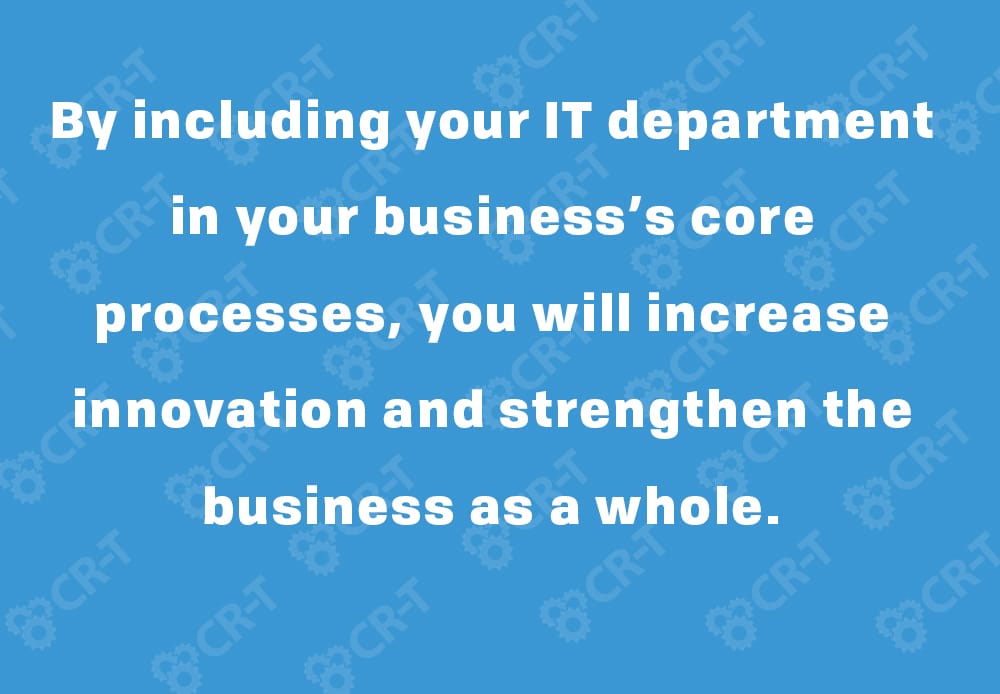
Building the Business at an Operational Level
Some businesses view an IT department’s value as starting and ending at the security level. But your IT department can do more than enhance your business’s security. They can strengthen every aspect of your business.
Recognize the Value of IT
Your IT department holds a unique value that allows them to contribute to the success of your company. IT professionals carry a cross-functional expertise, allowing them to recognize ways in which the business can operate more innovatively.
As you recognize the value of your IT department, you can empower them to contribute directly to the success of your business.
View the IT Department as a Strategic Partner and Innovative Anticipator
It’s easy to view the IT department as a group that simply responds to problems and solves the problems they are given. You give them a list of things to do, and the list gets completed.
But what if the IT department became more than just a solutions provider? Matrix.com proposes that an IT department can grow to become a strategic partner in the business, taking an active role in the decision-making process.
So how can you promote this kind of thinking in your organization? As a business owner, you can start by allowing your IT department to prove their worth. Draw on their unique expertise in making decisions and anticipating solutions to future needs.
In addition, you can show your value through specific results. Alex Beatty, a member of our support team, shared the following:
"IT Departments are integral to any organization, but it can be difficult to justify their cost to upper management sometimes. The key is to translate it into dollars and cents. Security? Show how much money has been lost by similar organizations due to breaches and compare it with the cost of a needed security control. Help desk? Ensure that every minute of support is documented in a ticketing system so that metrics can show how many man-hours are being spent addressing issues that could be spent on something more productive. Technology? Justify the new purchase by demonstrating how it solves an existing business problem, not by showcasing the features. Bottom line is, any IT role has to be part of generating growth for the company. It's up to IT to show how that growth can be accomplished."
By including your IT department in your business’s core processes, you will increase innovation and strengthen the business as a whole.
Make Your IT Department an Integral Part of the Business
Your IT department is more than just a team of technology experts. By leveraging the unique skill set each member of your IT team has to offer, you can enhance the success of your business and gain a competitive edge over your rivals.
Here at CR-T, we take pride in providing enterprise-level IT services at prices that work for small businesses. Our team of experts can become your IT support department, responding to issues quickly, often before you even know about them. Covering everything from your servers and network infrastructure, to your computers, workstations and mobile devices, we provide end-to-end solutions for all your technology needs.
Time and experience have helped us develop best practices and workflow procedures designed to keep your focus on your business, not your technology.
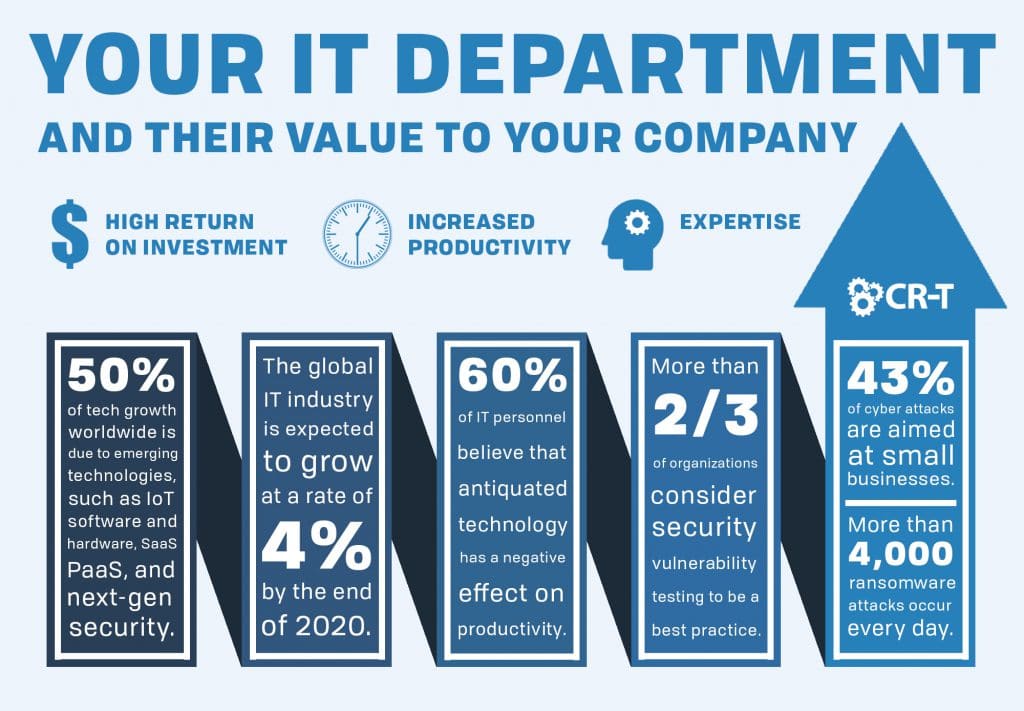
Blog & Media
Cloud Services
Managed IT Support
Cyber Security
Project Services
Servers/Infrastructure
Firewalls
Networking
Hardware/Software
Microsoft Products/Cloud
Amazon Web Services
Penetration Testing vs Vulnerability Scanning
If you’re responsible for managing the security of your organization’s network or systems, you may have heard the terms “penetration testing” and “vulnerability testing” thrown
Backup and Disaster Recovery
Your organization can’t afford to neglect backup and disaster recovery. If it takes your business too long to get back online after a disaster, you
6 Steps to Secure Customer Data
Securing customer data is essential for one major reason: your business depends on it. As an IT director, you recognize the importance of cybersecurity when
5 Steps to Promote Compliance in the Workplace
You’re familiar with the ever-changing world of regulatory compliance. Robust compliance enables you to avoid legal liabilities while improving your organization’s effectiveness. And many of
